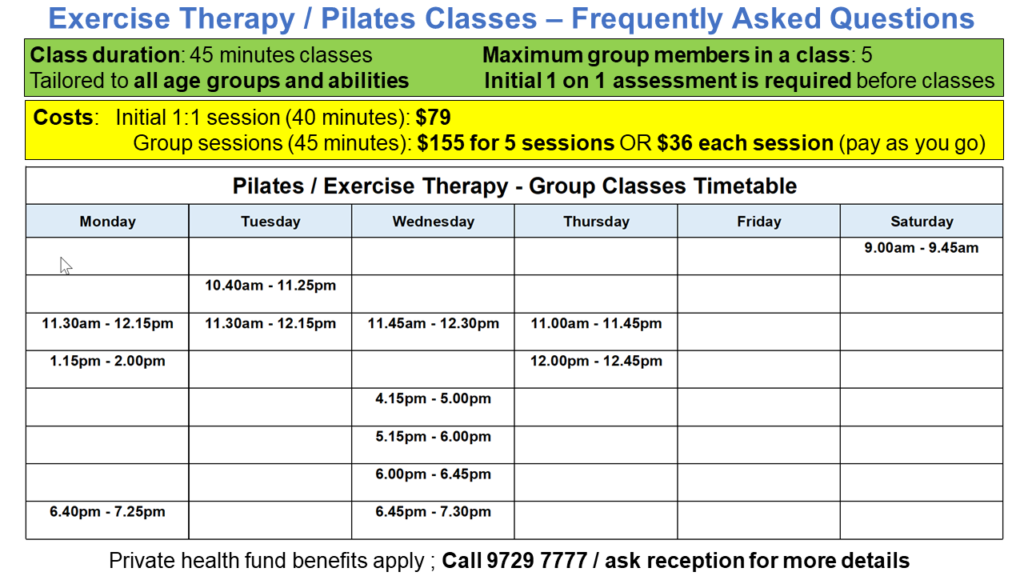Looking for a great Physiotherapist? You are not alone, whether you are undergoing rehabilitation for a serious condition or treatment to resolve a persistent niggle it is important that your Physiotherapist is the right fit for you and the treatment you require. Don’t panic, we’ve done the research to help guide you on your quest to choosing the perfect Physiotherapist.
What is a Physiotherapist?
Physiotherapists study the science of movement and learn how to pinpoint an injury’s root cause. They assess and diagnose the problem, then plan and provide treatment programs that aim to restore function or minimise dysfunction after disease or injury. This is achieved through a combination of manual therapy, movement training and the use of physical and electrophysical agents.
Physiotherapists provide services to people of all ages and across a wide spectrum of work
environments including hospital settings, rehabilitation, outpatients and in the community with the aim of helping people get the most out of life by:
- Recovering from injury
- Reducing pain and stiffness
- Increasing mobility
- Preventing further injury
As first contact practitioners, you don’t need a doctor’s referral to see a physiotherapist. Physiotherapists can assess your needs and tailor a treatment specific to your condition. However, Physiotherapists, doctors, and other health professionals will often work as part of a team to plan and manage treatment for a specific condition.
Physiotherapist Training

Physiotherapists are highly trained health practitioners and the industry is highly regulated. Entry to practise physiotherapy may be through a bachelor, masters or professional doctorate program that is approved by the Physiotherapy Board of Australia. To register, and then maintain their annual registration with the Australian Health Practitioner Registration Agency, physiotherapists must meet professional standards such as:
- Recent practice
- Continuing professional education
- Criminal history checks
- Work in accordance with the Board’s Code of Conduct
In addition, Physiotherapists must also be covered by professional indemnity insurance while practising.
Roles of a Physiotherapist
The role of a physiotherapist can vary and may include:
- Assess the physical condition of patients to identify problems and plan appropriate treatment.
- Perform spinal and peripheral joint mobilisation and manipulation (where appropriate).
- Assist in the reduction of pain and swelling, improve the range of movement, assist in muscle re-education and strengthening through the use of equipment/techniques such as hot/cold packs, electrotherapy, manual therapy, biofeedback, taping and splinting.
- Retrain patients to walk or use devices such as walking frames, crutches, sticks, wheelchairs, splints to assist/improve mobility.
- Assess the development of premature babies and plan and provide therapy for children with movement problems/physical disabilities.
- Assist individuals with permanent disabilities to maximise their ability to function as optimally as possible and to manage the physical demands of daily living.
- Work as part of a team of health professionals, to provide a multidisciplinary care plan, to improve a person’s health.
- Educate patients, their families, industry and the community to lead healthy lifestyles and to prevent injury and disability.
- Plan and implement community fitness/exercise programs, including hydrotherapy and Pilates programs for people both with and without a disability.
- Maintain relevant documentation associated with patient care eg. patient records, reports, statistics.
Physiotherapists may work as part of a healthcare team, independently in private practice, within the school system or as industry consultants. Some areas that Physiotherapists work include:
- Aged Care
- Rehabilitation
- Women’s Health
- Paediatrics
- Outpatients
- Orthopaedics
- Intensive Care
- Medical and Surgical wards
- Emergency Department
Specialist Physiotherapists
Physiotherapists may specialise in specific areas such as:
- Musculoskeletal Physiotherapy
- Women’s health
- Aged care
- Chest conditions
- Occupational health and safety
- Sports medicine
- Babies and young children
- Problems of the nervous system and spinal injuries
What is physiotherapy treatment?
Physiotherapy uses physical techniques to improve your movement, reduce your pain and stiffness, speed up your healing process and increase your quality of life.

Your session will be unique because it is all about you and your particular needs. In general, here’s what happens:
- The physiotherapist learns about your medical history
- The physiotherapist assesses and diagnoses your condition
- You receive a treatment plan that sets goals for you
- You are prescribed a course of exercises and any assistive devices needed
Physiotherapy can be used to treat a range of musculoskeletal conditions including:
- Back and neck pain
- Whiplash
- Headaches
- Sprained ankles
- Injured knees
- Ligament injuries
- Arthritic pain and stiffness
- Sciatica
- Shoulder pain
- Tennis elbow
- Tendon problems
- Muscle tears
- Hand and foot problems
- Bruising
- Post fractures
- Before and after joint replacements
- Before and after joint and bone surgery
- Muscle and ligament strains
Physiotherapy can also be used to assist, manage and treat the effects of these conditions:
- Ankylosing spondylitis
- Arthritis
- Bowel and bladder health
- Brain injury
- Burn injury
- Cancer
- Diabetes
- Dizziness and vertigo
- Fibromyalgia
- Heart health
- Lung health
- Lymphoedema
- Osteoporosis
- Pain (general)
- Pain (joint)
- Rheumatoid arthritis
- Spinal cord injury
- Stroke recovery
Physiotherapists are trained to assess your condition, diagnose the problem, and help you understand what’s wrong. Your treatment plan will take into account your lifestyle, activities and general health.
The following are common treatment methods used in Physiotherapy:
- Exercise programs to improve mobility and strengthen muscles
- Joint manipulation and mobilisation to reduce pain and stiffness
- Muscle re-education to improve control
- Airway clearance techniques and breathing exercises
- Soft tissue mobilisation (massage)
- Acupuncture and dry needling
- Hydrotherapy
- Assistance with use of aids, splints, crutches, walking sticks and wheelchairs to help you move around.
What should I look for in a physiotherapist?
Qualifications – To be a practising member of the Physiotherapy Board of Australia, your physiotherapist must have completed a degree and have full registration. By checking that your physio is a member of the PBA means that you can rest assured that he or she will meet the standards set by the Board. This includes indemnity insurance, codes of conduct, and ongoing professional development.
Specialisation – After completing their degree, many physiotherapists further their expertise and become specialists. There are many areas of expertise, including:
- Sports injury
- Mental health
- Aged care
- Stroke rehabilitation
- Ergonomics and office set up
- Spine and head injuries
- Respiratory problems
- Pregnancy
- Post-surgery rehabilitation
If you have a specific condition, look for a physiotherapist that specialises in that field. Otherwise, a general practising physio will be able to address a range of conditions.

Methods of treatment – Physiotherapists use a range of methods to ease pain, including movement, massage, manipulation and electrotherapy. But some physios are incorporating more alternative treatments into their methods of pain relief. These might include
- Acupuncture/ Dry needling
- Reflexology
- Reiki
- Hydrotherapy
- Shiatsu
- Bowen technique treatments
- Cranio-sacral therapy
- Neuro-structural integration
- Pilates
You can ask your physio what methods they use for treatments.
Accessibility – If you require regular sessions with a physio it’s important to make sure that they are easily accessible. Ideally, you’ll find a physiotherapist that is close to your home or work, and easy to access via public transport if necessary. If you need wheelchair access, check that they have disabled parking as well.
Availability – When we need a physio, chances are we need one immediately because we are in pain and need quick relief. If this is you, finding a therapist that is available immediately is better than finding the perfect physio that is booked out weeks in advance. It’s also good to know that your physio will be able to squeeze you into an emergency appointment if you need one before your next scheduled appointment.
Personality – Personality is an important factor in choosing your physiotherapist. It is important you are comfortable with your therapist. The process involves an in-depth history to determine causes of problems. It also involves hands-on manipulation of your body. Look for a physiotherapist that you feel relaxed with and who you feel you can trust.
Atmosphere – A clinic’s atmosphere plays a large part in how comfortable you are with your treatment. Choose a clinic that makes you feel comfortable and relaxed to get the most out of your treatment.
How much does physiotherapy cost?
The cost of your physiotherapy sessions will depend on the consult option that you require. Our fee structures are based on the following consult options. If you would like to know more please contact us on 9729 7777.
- 40 mins – New Patient – Initial Consultation
- 40 mins – Returning Patient – Existing clients presenting with a new episode
- 20 mins – Standard Consultation – For clients returning for a review / follow up session of a current episode of care
Depending on your health insurance policy you might also be able to claim a rebate on part of your physiotherapy treatment.

You might also be able to claim a Medicare rebate for physiotherapy, using a Chronic Disease Management Program (CDM) from your GP. You need to see your GP first, to make sure your condition meets the necessary criteria (had a chronic condition for longer than 6 months, or will last longer than 6 months). Once your GP has determined your eligibility and gives you a referral you will receive a rebate for 5 sessions. This will be to a specific clinic. Once you complete these sessions you can continue your treatment at a clinic of your choice.
Physio Elements Physiotherapy
Physio Elements is a one-stop health and wellness clinic for our valuable clients in and around the Kilsyth community. Our highly qualified Physios work passionately to ensure the best care and outcomes, providing services to a population spanning out to more than 15 kms radius that includes:
- Kilsyth
- Montrose
- Mt Evelyn
- Mooroolbark
- Croydon
- Bayswater
- Bayswater North
- Ringwood
- Ringwood East
- Heathmont
- Lilydale
- Boronia
- Silvan
- Seville
- Wandin
- Mt Dandenong
- Olinda
- Chirnside Park

To make an appointment with one of our Physiotherapists you can contact us on 9729 7777, email us physioelementsandpilates@gmail.com or book through here.

